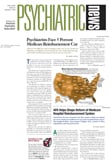That bastion of learning and memory in the brain—the hippocampus—may also be a broker between psychological stress and the development of psychiatric disorders.
For instance, posttraumatic stress disorder (PTSD) patients, as well as traumatized monkeys, have been found to lose neurons in the hippocampus. Both PTSD patients and depressed persons have abnormally small hippocampi (Psychiatric News May 19, 2000).
But when might stress unleash hippocampal changes that in turn help set psychiatric disorders into motion? Either during childhood or during adolescence, some new rodent studies suggest. The studies were conducted by Susan Andersen, Ph.D., an assistant professor of psychiatry at Harvard University Medical School, and her colleagues. She reported the findings at the 15th Annual Scientific Symposium of the National Alliance for Research on Schizophrenia and Depression (NARSAD), which was held in New York City in October.
In their first study, Andersen and her co-workers stressed rat pups during their childhood period, that is, isolated them from their mothers for four hours a day during their first 20 days of development. The researchers then autopsied the rats and compared the density of the nerve synapses in their hippocampi with the density of the nerve synapses in the hippocampi of same-age rats that had not been stressed. The former group had less-dense synapses.
In their second study, Andersen and her team took “adolescent” rats that had had a “normal” childhood and stressed them by isolating them from their peers. The researchers compared the density of the nerve synapses in their hippocampi with the density of the nerve synapses in the hippocampi of adolescent rats that had not been stressed. The investigators found less synaptic density in the hippocampi of the former than in the hippocampi of the latter.
Thus, when a rat is stressed during a period equivalent to either human childhood or adolescence, it looks as if it can adversely affect the animal’s hippocampal nerve synaptic density.
Rats, of course, are not humans, but if the results can be applied to humans, then it raises the question of whether that stress experienced during either childhood or adolescence might be capable of impairing hippocampal nerve synaptic density.
And such damage in turn might then help set the stage for PTSD, depression, schizophrenia, and some other psychiatric disorders, Ariel Deutch, Ph.D., a professor of psychiatry and pharmacology at Vanderbilt University Medical Center, speculated at the symposium.
The results also suggest that if some way could be found to counter hippocampal nerve synaptic loss, it might constitute an effective treatment for such psychiatric disorders, Deutch pointed out. In fact, Andersen noted that she and her team will be investigating whether novel pharmacological treatments can restore hippocampal synaptic density in stressed rodents. ▪
